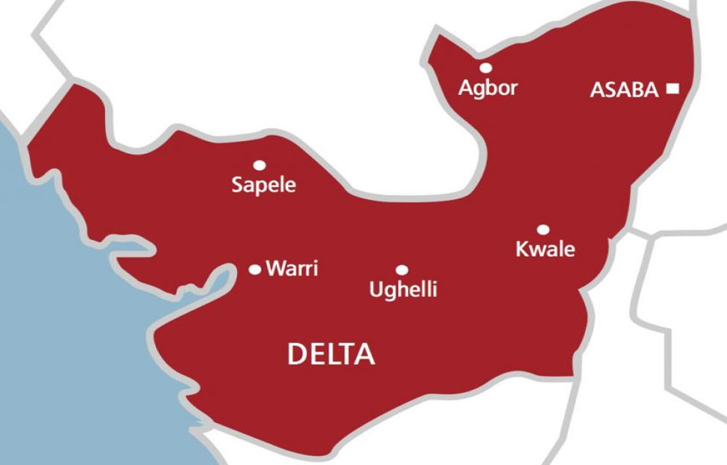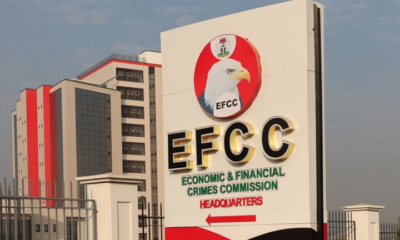Crime
EFCC Embraces Global Best Practices, Reviews Bail Terms

The Economic and Financial Crimes Commission (EFCC) has reviewed its operations in line with international best practices, the 1999 Constitution, the Administration of Criminal Justice Act, 2011 and its Standard Operating Procedures (SOP).
These were detailed in a statement Head of Media and Publicity, EFCC, Dele Oyewale, in which he made it clear that there would be no more blanket arrest and detention of suspects.
It was gathered that the anti-graft agency would in line with international practices, put an end to arbitrary confiscation of suspects’ international passports, while they were being investigated.
Consequently, the EFCC directed its entire staff to exercise discretion in demanding suspects’ passports.
Operatives were also directed to ask for reasonable and practicable bail conditions from suspects and their sureties.
According to a statement by the anti-graft agency rolled out new conditions following the review of its guidelines on arrest, bail and processing of suspects.
It stated, “The Economic and Financial Crimes Commission (EFCC), has reviewed its guidelines on arrest, bail and processing of suspects.
“The review, which is premised on the need to adhere to the rule of law and international best practices in the treatment of suspects, was rolled out on Monday, October 31, 2023, across all its Commands.
“In the new guidelines, premium attention is focused on the rights of suspects, especially where arrest, detention and bail issues are concerned.
“Operational activities are to be tailored towards relevant provisions of the Constitution of the Federal Republic of Nigeria, 1999 (as amended), the Administration of Criminal Justice Act, 2011, and the EFCC’s Standard Operating Procedures (SOP).”
Therefore, the EFCC directed all its operatives to stop the blanket seizure of International passports of suspects and the imposition of cumbersome bail conditions.
“Specifically, operatives of the Commission are not allowed to demand for professional certificates of sureties as a bail condition.
“Also, every demand for international passports of suspects would henceforth be exercised with discretion, depending on the nature of the case, personality, and country of residence of the suspect,” it added.
Director, Legal and Prosecution Department, EFCC, Silvanus Tahir, SAN, cautioned that, “Bail conditions served on suspects must be reasonable and practicable to be fulfilled by suspects and their sureties.
“Detention of suspects without a Remand Warrant for unreasonable length of time beyond the constitutionally allowed period must henceforth stop forthwith.
“Officers of the commission are also warned against unwarranted violation of the rights of suspects.”
He called for professionalism in all operational activities, stressing that “it is time to have a paradigm shift and change the narrative. Henceforth, professionalism shall be the watchword. Let’s follow the best international standards worth our identity as a flagship law enforcement agency.”
Crime
Adeleke Condemns Ilesa High Court Burning, Orders Investigation

Osun State Governor, Senator Ademola Adeleke has condemned the burning of Ilesa High Court 2 building by yet to be identified criminals, describing the arson as “an unjustifiable attack on the state judiciary”.
The incident which happened overnight led to the destruction of court sensitive documents and exhibits with the entire building largely burnt to the ground.
It was gathered that the state fire service was mobilised to the scene but the havoc was already over by the time of their arrival. There are indications that files relating to sensitive court cases were destroyed.
ALSO READ: Okpebholo Accounts For Stewardship To Kinsmen
Gov Adeleke in the statement directed thorough investigation into the incident as well as beefing up security across all court premises in the state.
He stated, “Thorough investigation must be conducted by the security agencies to apprehend the suspects and ensure they face the consequences of their actions. I further direct security agencies to beef up surveillance across the various court buildings.
“Additionally, the Attorney General and Commissioner for Justice is to join hands with the Ministry of Works and Infrastructure for the immediate rehabilitation of the burnt down building.”
Gov Adeleke described the attack as a threat to democracy and noted that the judiciary remains the stabilizer and critical arbiter of the democratic process, urging support rather than attack for the judiciary.
Crime
Four Children Vanish Days After Women Move Into New Apartment In Delta

Fear and anxiety have spread across the Ogwashi-Uku community in Aniocha South Local Government Area of Delta State following the abduction of four children by suspected child traffickers.
The incident occurred on Sunday in the Umuokwe quarters, where two of the victims — identified as siblings, Ebube and Miracle — were reportedly taken by three unidentified women.
The women had only recently moved into the area after securing emergency accommodation.
READ MORE: Edo Prescribes Death By Hanging For Kidnappers
Community sources said the suspects lured the children from their homes under the pretense of buying them biscuits from a nearby shop.
“It was when the children could not be seen around the compound that neighbours expressed concern,” a resident said.
“By the time the neighbours visited the ladies’ apartment, the room was empty as neither the occupants nor the children could be found.”
Confirming the development, the Police Public Relations Officer for Delta State Command, SP Bright Edafe, said the landlady who rented out the room to the suspects has been arrested and is currently in custody.
“The children were abducted three days after the women rented the apartment,” Edafe stated.
“It is true; the problem is that there is no link. They just came and said they wanted to rent an apartment and the landlady gave it to them with no details, no name, no phone number, no agreement, and after three days they carried four children. The landlady has been arrested because her actions are suspicious.”
Security agencies have launched a manhunt for the suspects, while the community remains on alert as the search for the missing children continues.
Crime
Alleged Murder: Police Confirm Arrest, Extradition Of ‘Killaboi’ After Months-Long Hunt
Benjamin Best Nnayereugo, popularly known as ‘Killaboi,’ has been extradited to Nigeria from Doha, Qatar, to face trial for the alleged murder of 21-year-old university student Augusta Onuwabhagbe.
The Nigeria Police confirmed his arrival in the country in the early hours of Saturday, following months of international manhunt and collaborative efforts involving INTERPOL, the Federal Ministry of Justice, Qatari authorities, and the Nigerian Police.
Nnayereugo, who had been declared wanted in October 2023, was accused of killing Onuwabhagbe—a first-class student of Lead City University, Ibadan—on July 13, 2023, at his residence in Ajah, Lagos.
READ MORE: Wanted Instagram Influencer Killaboi Arrested In Sierra Leone
“The Nigeria Police Force has successfully completed the extradition of Benjamin Best Nnayereugo, male, widely known as ‘Killaboi,’ from Doha, Qatar to Nigeria,” a statement by the Force Public Relations Officer, ACP Olumuyiwa Adejobi, read.
The extradition was initiated following a petition from the family of the deceased on September 29, 2024, which triggered INTERPOL NCB Abuja’s involvement.
After the murder, the suspect fled the country and released a video online purporting to confess to the crime — a move police described as “a deceptive strategy to derail investigative efforts.”
Following his declaration as wanted by the Lagos State Police Command, an INTERPOL Red Notice was issued.
He was eventually arrested in Sierra Leone under the alias “Kanu Princeton Samuel” on October 20, 2023, but escaped custody in a prison break the following month.
Authorities tracked the fugitive’s movements across West Africa, East Asia, and the Middle East before he resurfaced in Doha on January 24, 2025, living under the false name “Toure Abdoulaye” with a fake Guinean passport.
In February, Qatari authorities arrested him after advanced biometric verification confirmed his identity. The Nigerian government’s extradition request was later approved.
The Inspector-General of Police, IGP Kayode Egbetokun, praised the international cooperation that led to Nnayereugo’s return.
“The synergy amongst nations is vital to curb trans-border crimes,” the IGP said, while assuring Nigerians that the fugitive will face diligent prosecution.
Nnayereugo’s case had earlier drawn widespread attention, with the Lagos State Police issuing a public alert for information on his whereabouts.
At the time, the police described him as a 26-year-old, 5’9″ tall, dark-complexioned man from Abia State who spoke English, Igbo, and Pidgin English fluently.
The Nigeria Police have reiterated their commitment to justice, assuring the public that all necessary steps will be taken to ensure accountability.



















